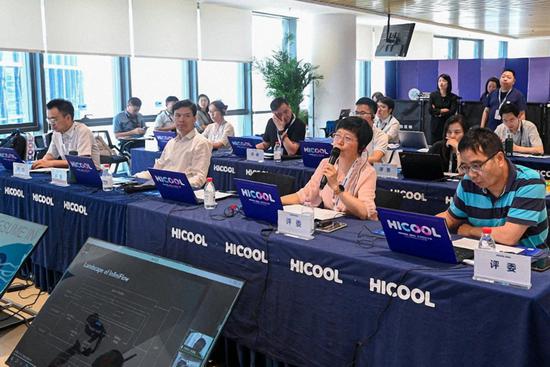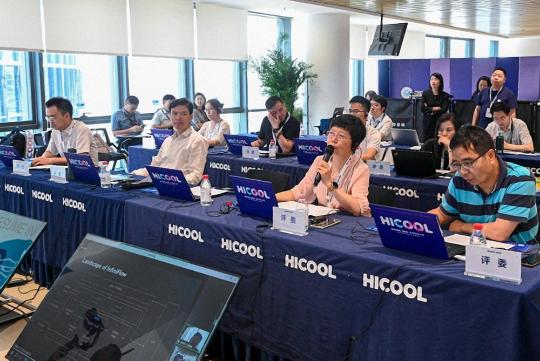Fintech, large language models match made in heaven

A judge comments on projects during the HICOOL Global Entrepreneur Competition in Beijing in June. (Photo provided to China Daily)
The rapid emergence of new technologies, particularly AI represented by large language models, is driving transformative changes in China's financial sector. However, more efforts are needed to overcome regulatory and ethical challenges to fully tap their potential, experts said.
The comments came after a series of policy documents were issued to support and nurture new quality productive forces in the financial industry. In April, the China Banking and Insurance Regulatory Commission, the Ministry of Industry and Information Technology, and the National Development and Reform Commission jointly released a notice to deepen AI-related financial services in manufacturing to aid the advancement of new industrialization. The document emphasized the need for lenders and insurers to implement innovation-driven development strategies.
Xin Guobin, vice-minister of industry and information technology, said a technology-industry-finance integration initiative has been launched to explore industrial and financial cooperation in innovative ways. Over the past three years, the initiative has facilitated over 830 billion yuan ($114 billion) in corporate financing, supporting more than 290,000 high-quality enterprises and involving over 2,400 financial institutions.
As financial institutions work to help the real economy embrace cutting-edge technologies, it is also of great importance for them to adopt the latest tech for innovation, experts added.
Yang Xiaojing, an AI standards expert with the Internet Society of China, said China's fintech sector is among the global leaders, especially in the area of mobile payments.
"Driven by a robust consumer market and technological advancements, China has become one of the largest fintech markets globally. Chinese companies, talent and technologies are increasingly integrating into and influencing the global industry chain," Yang said.
AI technology — particularly LLMs — is rapidly evolving and reshaping the financial sector.
Yang, who has witnessed the development of AI in finance through three stages, highlighted that from 2010 to 2014, AI was primarily used for analytical purposes.
From 2015 to 2020, the availability of vast unstructured data-enabled machine learning to discover new investment factors. This was when Yang and her team managed to integrate Baidu's search data and spatial-temporal data with deep learning technology to launch the first automated credit bond analysis service (Credit IQ) and the first AI mutual fund in the domestic capital market. Credit IQ successfully implemented automated monitoring for 500 billion yuan worth of credit bonds within four months.
And the third stage started from 2020, when LLMs combined with domain-specific knowledge and smart agents began to replace certain productivity aspects in the financial sector, Yang added.
For example, OpenAI, the United States company that has developed ChatGPT, views finance as a primary application area for its technologies. Collaborating with Morgan Stanley, it introduced an AI-based investment advisor using GPT-4, and more recently partnered with US social media site Reddit to utilize community content for model training.
Yang said AI applications in finance can be categorized into four main areas: intelligent risk control, robot investment advisors, intelligent customer service and AI-assisted investment research.
"China's leadership in digital banking transformation places it at the forefront of intelligent risk control," Yang said, adding that banks like the Industrial and Commercial Bank of China and Agricultural Bank of China have developed proprietary LLM platforms for intelligent risk control and operations.
Robot investment advisors have seen significant adoption in the US, and Chinese internet securities platforms such as Eastmoney and Tonghuashun have also launched smart dialogue services backed by LLMs, Yang said.
Intelligent customer service is a priority across financial institutions due to their large user base and immediate demand. AI-assisted investment research is a growing area of interest for both domestic and international investment firms, the expert added.
Despite all the progress, however, the regulatory framework and ethical standards for AI applications in finance are still developing, experts said.
"The AI era is likened to foundational infrastructure like water and electricity, necessitating global cooperation. While the US leads in model development, China is rapidly catching up with significant advancements in AI patents and applications," Yang said.
As a judge for the HICOOL Global Entrepreneur Competition held in June, Yang observed a strong presence of overseas projects, highlighting the potential for global collaboration. She sees a promising future for Sino-US cooperation in AI, benefiting global AI development and fostering a responsible AI ecosystem.
"Collaborative efforts and exchanges between experts from both nations can lead to mutual progress and innovation in the financial sector," Yang added.

